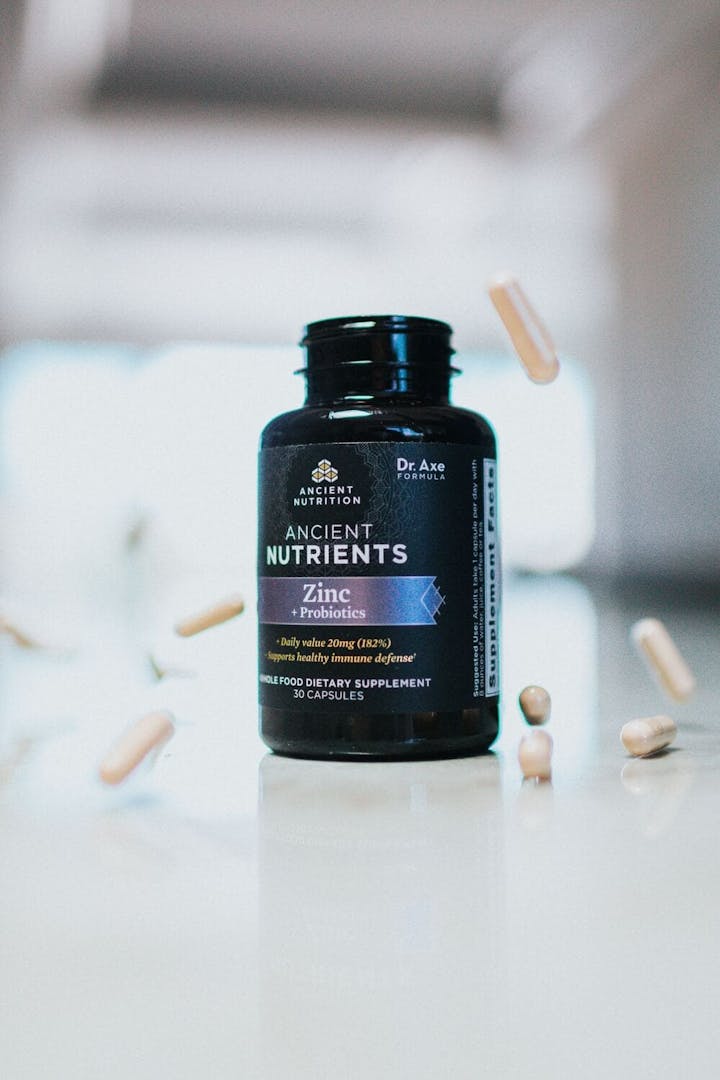Zinc is a mineral with several health benefits when consumed in sufficient amounts. It can also have positive effects on your performance. In this article, we’ll tell you more about it!
What is zinc?
Zinc is found in every tissue of the body. It is directly involved in cell division and maintaining hormone levels.
Additionally, zinc is a potent antioxidant, and a deficiency in this mineral can greatly impact the immune system. A low zinc level can lead to a direct and rapid decline in T-cell function: T-cells boost the body’s immune system when viruses, bacteria, or health issues arise.
What does zinc do?
Since zinc is involved in the production and regulation of hormones, various other outcomes are linked to its deficiency. For example, zinc plays a significant role in brain function: it regulates dopamine, a stimulating neurotransmitter that gives you drive and focus.
Zinc also promotes the production of melatonin, an essential hormone for healthy sleep. Research shows that adequate zinc intake contributes to improved cognitive functions, energy levels, and sleep. A low zinc level worsens the effects of stress on the body and accelerates cellular aging.
Zinc deficiency? These are the effects
Other interesting research results show that zinc deficiency may play a role in infertility and possibly lower libido. Zinc is directly involved in egg cell production. When women have a zinc deficiency, the egg cell may not mature properly, hindering ovulation. Adequate zinc allows the female body to efficiently use the hormones estrogen and progesterone, supporting fertility.
In men, zinc is involved in the regulation and production of hormones, particularly as it relates to healthy testosterone levels. A low zinc level in men can impair testosterone production, leading to a risk of prostate cancer, reduced libido, and potential infertility.

Benefits of a healthy zinc level
A healthy zinc level improves physical performance and promotes muscle development in both men and women. It affects protein synthesis and is necessary for the proper functioning of red blood cells. Due to its influence on hormone regulation, zinc can also enhance post-exercise recovery.
Where can you find zinc?
The body absorbs zinc through food. Zinc-rich foods can include dairy products, whole grains, nuts, meat, and shellfish (oysters are known for their high zinc concentration). A zinc deficiency may occur if you don’t consume enough protein-rich foods or consume too many refined sugars.
Furthermore, deficiencies can occur in people with digestive problems, low stomach acid, or excessive alcohol consumption. Certain medications can also lead to a zinc deficiency, and hormone therapies such as birth control can have an impact as well.
How can you detect a low zinc level?
A low zinc level can be noticed through changes in taste, such as a greater desire for extra salty or sweet foods. The symptoms can vary widely, making it difficult to self-diagnose a zinc deficiency. Common signs may include diarrhea, chronic fatigue, a weakened immune system, poor memory or concentration, brittle nails, hair loss, or slow wound healing.
How much zinc per day is recommended?
The advice from the Nutrition Center for adults is an average intake of around 9 mg per day. This may vary for individuals with higher requirements, such as those who engage in intense physical activity, consume less protein as vegans, or are pregnant/nursing.
While it is difficult to consume excessive zinc through food, the European Food Safety Authority (EFSA) has set an upper limit of 25 milligrams. Individual needs can vary significantly depending on personal circumstances.
Zinc supplements
If you think you may need extra zinc, it is possible to take it as a supplement (e.g., to support the immune system).
You can choose zinc chelate or zinc with copper. It’s essential to take zinc supplements during a meal to prevent nausea. Coffee can reduce zinc absorption by 50 percent, so it’s best to wait for an hour between zinc intake and having a cup of coffee. For better absorption by your body, it’s also advisable not to take zinc with magnesium or iron at the same time. Selenium makes a strong combination with zinc – it’s therefore often combined in supplements.

Zinc test: What does your body need?
If you want to determine whether your body has a zinc deficiency, it may be advisable to take a zinc test. You can do this through a specialist or even request a self-test online, and the results are often quickly available.
You may feel more energized and revitalized when your body has sufficient zinc! Feel free to ask our dietitian for advice if you have any questions about this.

